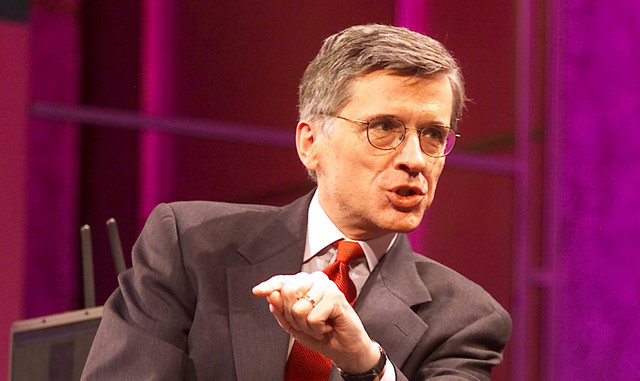When I first learned that President Obama had nominated the former president of CTIA and the National Cable Television Association to be the next chairman of the Federal Communications Commission, my stomach turned: If there’s one thing that this country doesn’t need, it’s yet another former lobbyist appointed to a high position in the United States federal government. But after my initial gag reflex wore off, I found myself intrigued by the reaction from many activists whom I’d expected to slam the pick — Public Knowledge CEO Gigi Sohn, for instance, said that Wheeler was likely to champion “strong open Internet requirements, robust broadband competition, affordable broadband access for all Americans, diversity of voices and serious consumer protections, all backed by vigorous agency enforcement.” And Ars Technica notes that Cardozo School of Law professor Susan Crawford, who has long been a fierce critic of the cable industry, has also endorsed the nomination.
Because of this, I decided to have an open mind as I read through some entries on Wheeler’s personal blog, where he’s written a lot about the wireless industry and telecom policy in general. What I found was that he’s indeed a very smart guy who has a core philosophy of what telecom policy should be and is not a talking point-spouting shill for the incumbent carriers. All that said, however, I cannot overlook the fact that I think he got the most important decision of American wireless policy over the past four years completely wrong.
Yes, I’m referring to the now-dead merger between AT&T and T-Mobile, which Wheeler’s predecessor Julius Genachowski helped kill. In a blog entry from September 2011, Wheeler wrote that the best solution would be for the government to sign off on the merger between the two carriers in exchange for AT&T agreeing to tougher new regulations. In proposing this idea, Wheeler said that his hope was “that the conditions ultimately imposed on AT&T by the government would not only establish rules for Ma Bell, but would then expand from the largest carrier to all others.”
So what’s the problem here? For starters, it seems as though Wheeler’s framework for approving AT&T’s purchase of T-Mobile has a significant danger of entrenching regulatory capture — that is, when a private company uses its vast size and influence within the government to craft rules that perpetuate its status as either a monopoly or as part of a protected oligopoly.
In fact, Wheeler’s proposal didn’t even call for formal regulations but rather for the government and the incumbent carriers to agree to “a consent decree to pseudo-regulatory behavioral standards” that would hopefully be pushed out to the rest of the wireless industry at some point. Wheeler himself concedes that such consent decrees are “traditionally for a limited duration,” he believes that “such concepts once established with the largest carrier could have been lifted into subsequent consent decrees for other carriers and even into the terms for subsequent spectrum auctions.”
What’s more, the whole concept of “pseudo-regulatory behavioral standards” doesn’t sound nearly as enforceable as actual regulations and laws. Even worse, the quality of such handshake deals is usually based entirely on the quality of the regulators — and even well-constructed ad hoc deals can easily overturned by an FCC that is more sympathetic to carriers’ complaints that they’re being regulated too heavily.
In all, then, Wheeler’s plan to make the AT&T-T-Mobile merger beneficial to consumers relies too much on a complex series of levers that have no guarantee of ever being pressed. In contrast, consider what has happened ever since the merger was blocked: T-Mobile has acquired additional spectrum from AT&T as part of a severance deal between the two carriers and has now successfully merged with MetroPCS to give it enough spectrum to compete with the big incumbents on a nationwide basis. Even more importantly, T-Mobile has engaged in a relatively bold experiment to ditch wireless contracts and give consumers different options for how they pay for their favorite wireless devices.
While it’s too soon to say whether consumers will find these new plans beneficial, it is clear that T-Mobile has emerged as a significant fourth option in the wireless market. And call me crazy, but I’ll take a more competitive wireless market over a state-sanctioned duopoly any day of the week.






